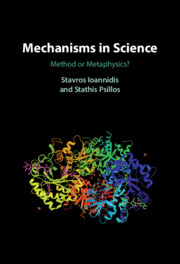Book contents
- Mechanisms in Science
- Mechanisms in Science
- Copyright page
- Dedication
- Contents
- Figures
- Preface
- Introduction
- Part I Ideas of Mechanism
- Part II Causation and Mechanism
- Chapter 3 Mechanisms in Scientific Practice
- Chapter 4 Mechanisms as Causal Pathways
- Chapter 5 Mechanisms, Causation and Laws
- Chapter 6 Against Activities
- Chapter 7 Whither Counterfactuals?
- Part III Beyond New Mechanism
- Finale
- References
- Index
Chapter 6 - Against Activities
from Part II - Causation and Mechanism
Published online by Cambridge University Press: 09 June 2022
- Mechanisms in Science
- Mechanisms in Science
- Copyright page
- Dedication
- Contents
- Figures
- Preface
- Introduction
- Part I Ideas of Mechanism
- Part II Causation and Mechanism
- Chapter 3 Mechanisms in Scientific Practice
- Chapter 4 Mechanisms as Causal Pathways
- Chapter 5 Mechanisms, Causation and Laws
- Chapter 6 Against Activities
- Chapter 7 Whither Counterfactuals?
- Part III Beyond New Mechanism
- Finale
- References
- Index
Summary
In Chapter 6, we defend the difference-making thesis of Causal Mechanism, that is, the view that mechanisms are underpinned by networks of difference-making relations, by showing that difference-making is more fundamental than production in understanding mechanistic causation. Our argument is two-fold. First, we criticise Stuart Glennan’s claim that mechanisms can be viewed as the truth-makers of counterfactuals and argue that counterfactuals should be viewed as metaphysically more fundamental. Second, we argue against the view that the productivity of mechanisms requires thinking of them as involving activities, qua a different ontic category. We criticise two different routes to activities: Glennan’s top-down approach and Phyllis Illari and Jon Williamson’s bottom-up approach. Given these difficulties with activities and mechanistic production, it seems more promising to start with difference-making and give an account of mechanisms in terms of it.
Keywords
- Type
- Chapter
- Information
- Mechanisms in ScienceMethod or Metaphysics?, pp. 138 - 163Publisher: Cambridge University PressPrint publication year: 2022

